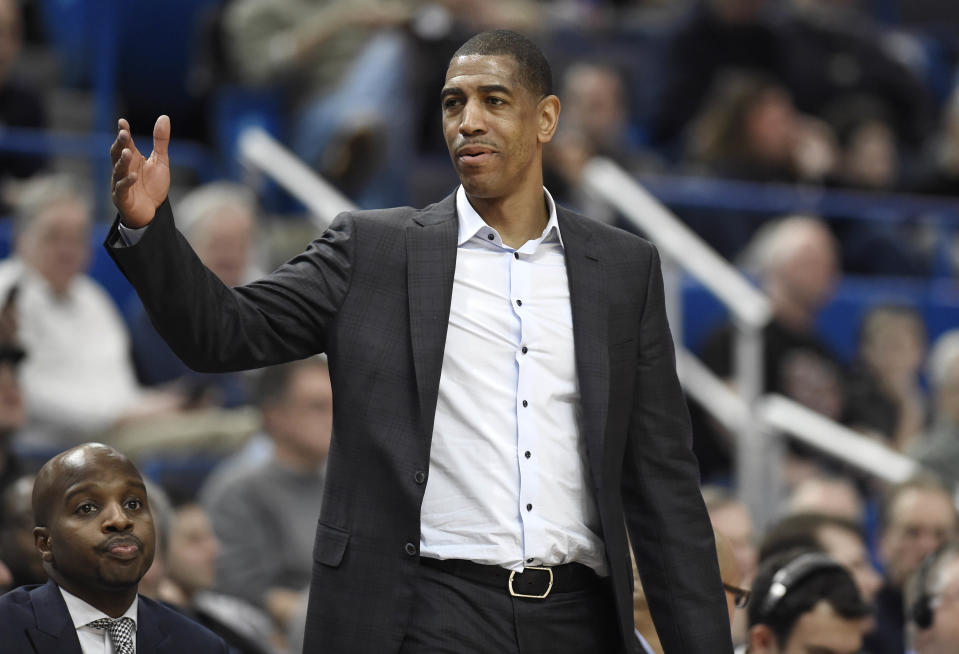UConn men's basketball hit with NCAA penalties, including 3-year show-cause for Kevin Ollie

Former UConn head coach Kevin Ollie has been hit with a three-year show-cause penalty following a lengthy investigation by the NCAA.
An NCAA infractions panel concluded that Ollie violated head coach responsibility rules, failed to monitor his staff and did not promote an atmosphere of compliance during his time as the Huskies head coach.
In addition to the show-cause penalty for Ollie, who was fired after the 2017-18 season, the program was given two years probation and will be forced to vacate wins in which ineligible players participated. The school previously self-imposed a reduction of one scholarship for 2019-20 and other recruiting restrictions, which were upheld by the NCAA. Among the self-induced penalties includes a two-week ban on unofficial recruiting visits in 2019-20.
According to the NCAA, Ollie was not forthright during the investigation and “knowingly provided false or misleading information” when meeting with NCAA officials, leading to more severe individual punishment.
“This case illustrates the importance of full candor and cooperation in the infractions process, as well as head coach control,” the committee said in its decision. “The former head coach faltered in both respects, increasing the severity of his violations and allowing violations within the program to occur for most of his tenure.”
The show-cause penalty effectively keeps Ollie out of college coaching through its duration. According to the Journal Inquirer, UConn will vacate games from the 2016-17 and 2017-18 seasons. The team went 30-35 over in that two-year span.
What NCAA rules did UConn break?
UConn’s NCAA violations “stemmed from three situations,” according to the NCAA.
First, the NCAA says UConn did not properly follow rules associated with pickup games, violating limits associated with “activity limits” for student-athletes. In UConn’s case, student managers for the basketball team would attend and keep statistics for preseason pickup games involving men’s basketball players. Those statistics would be “regularly printed, copied and distributed to coaches.”
Because the games were monitored by student managers, the NCAA’s committee on infractions deemed them “countable athletically related activity.” Because these games happened “two to four times a week,” the committee determined that the “program exceeded the allowable amount of activity.” The NCAA says Ollie was aware this was occurring “over the course of four years” and “did not report them to compliance staff” or “ask if they were permissible.”
Second, the Huskies’ video coordinator violated rules by directly reviewing plays with and answering from student-athletes. The NCAA concluded that this “instruction” went beyond the responsibilities of his position and caused him to “become a countable coach.” Because the NCAA only allows a certain number of coaches, those actions caused the program to “exceed its countable coaches limit.” The video coordinator reported to Ollie and the NCAA concluded that he “did not monitor” or “ask questions” about “the nature of the film review.”
Third, the NCAA says a trainer who was a friend of Ollie gave out free training sessions and provided “free lodging, meals, transportation and access to a private gym” to three student-athletes, all of which are impermissible benefits in the eyes of the NCAA. Ollie denied knowing his players worked with the trainer, but committee on infractions said “multiple individuals corroborated” that Ollie knew about the arrangement.
Among other violations were improper video calls between recruits and NBA players arranged by Ollie. According to ESPN, calls with former UConn stars Ray Allen and Rudy Gay were arranged for a top recruit. Ollie denied arranging the calls, but the NCAA says there was “substantial information that demonstrated” otherwise.
“Failing to give the enforcement staff truthful information significantly harms its ability to conduct a thorough and timely investigation,” said the committee’s report. “The conduct was contrary to the standards of ethical conduct that the membership expects of athletics staff entrusted to set an example for student-athletes.”
Ollie in middle of litigation with UConn
Like he did throughout the investigation, Ollie has denied intentionally breaking NCAA rules. When the school fired Ollie, it fired him for cause citing the impending NCAA violations and did not pay him the remainder of his contract. That move prompted a lawsuit from Ollie, who is seeking the $10 million remaining on the final three years of the contract he signed with the university.
Ollie played at UConn from 1991-95 and was promoted to head coach in 2012 after three seasons as an assistant. He led the Huskies to a national championship in his second season, but the program fell off in the ensuing years, missing the NCAA tournament in three of his last four seasons as head coach.
UConn just rejoined the Big East
The news of NCAA sanctions comes a week after the school left the AAC to rejoin the Big East.
UConn was an original member of the league in 1979 and remained in the Big East until 2013. The Huskies will play in the AAC one last season before returning to the Big East in 2020.
After firing Ollie, UConn hired Dan Hurley from Rhode Island. The Huskies went 16-17 in his first season as head coach.
More from Yahoo Sports:

